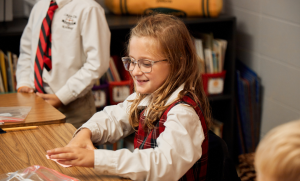Written by David Seibel | 1.13.2020
Sir Isaac Newton (1642-1727) said, “The only difference between my mind and the minds of others consists solely in having more patience.”
This quote is remarkable considering the genius of Newton’s three great discoveries: the principles of calculus, the composition of white light, and the law of universal gravitation. One would expect that the secret ingredient of a mind like his was a gigantic IQ. But Newton does not credit his achievements to his IQ or any inherited disposition, but rather to patience. In other words, he kept showing up eager to learn long after his peers had given up.
If you are educating kids today, you must know that students suffer from two calamities only a dedicated instructor can help them correct: students are impatient with their results, and students are impatient with the development of their intellectual powers.
Bad outcomes can distract us from the process of improvement.
Failure #1: Students Want Results Too Quickly
One of the gifts that comes with age is a sense of timing, which is primarily developed by being disappointed and recalibrating your expectations. Children ask, “Are we there yet?” because they have not developed any sense of how long it takes to drive from Indianapolis to Gulf Shores. They may know the formula “Time= Distance/Speed,” but they don’t really know that formula in feeling. Rather, they feel an unpleasantness in their bellies that they want to relieve with entertainment, distraction, or gummy bears.
Children are hard-wired to assume the following: “I tried hard at this particular task; therefore, I deserve to be successful.” It is not true that diligence directly results in realizing your destiny. Good comes to those who wait, especially those who work while they wait. Like waiting in a long car ride, this is experientially unpleasant. It does not feel good to skin your knees, underperform while people are watching, or be rejected by those you thought were friends. Bad outcomes can distract us from the process of improvement. Those who have developed their patience muscles can stay committed to the process while dealing with undesirable outcomes.
Examples abound of people who did not let temporal failure result in ultimate failure. Consider Abraham Lincoln, Michael Jordan, Thomas Edison, Helen Keller, Ulysses S. Grant, George Washington, Harry Truman, Franklin Roosevelt, and many more. These people are known for their great achievements, but their shortcomings are many. Alcoholism, bankruptcy, mediocre military leadership, poor management in business, paralysis, and outright embarrassment for poor decisions, to name a few. These failures bred confidence without arrogance in these leaders. Grit and grace are developed in the crucible of public failure. To be great, you have to be okay with feeling small. Results come to those who work, wait, and stay focused on the process.
The fruits of attention and observation and analysis grow organically, not mechanically.
Failure #2: Students Want Growth Too Quickly
It takes a long time to become great at something. The difference between good and great is if the first failure has to do with being overly fixated on one’s results, this failure has to do with over-emphasizing one’s deficiencies. To double your success, you must triple your failure. This means that if someone wants to develop their powers of mind and ability, they must have plenty of repetitions of failure. Failure is fertilizer for growth. It is really simple, even though it is not that easy. We need more adults who place emphasis on students laboring to give attention even when it is boring, hard, or tiring. It may be the teaching sin of our age that we call in the jury too quickly to judge what a student can or cannot do. Not only should we encourage students to be patient with their failures of outcome but also their own weaknesses revealed in the process.
It takes a long time to build the muscle of the mind that enables you to work at one thing without interruption for a long time. How many students do you know that could read for a length of time equal to their age? In his essay Education, Our Own Work, John Todd wrote, “Patience is a virtue kindred to attention; and without it, the mind cannot be said to be disciplined.” Developing these durable pathways in the brain takes thousands of repetitions, and it is the calling of all educators. Elevating the mind to a higher state of existence is not possible without patience. The fruits of attention and observation and analysis grow organically, not mechanically. Thus, there is a great need for developing Failure-Tolerant Students.
In an article from the Harvard Business Review, Richard Farson and Ralph Keyes write, “Try to break down the social and bureaucratic barriers that separate them from their followers. They engage at a personal level with the people they lead. They avoid giving either praise or criticism, preferring to take a nonjudgmental, analytical posture as they interact with staff. They openly admit their own mistakes rather than covering them up or shifting the blame. And they try to root out the destructive competitiveness built into most organizations.”
Perhaps the great need of the moment for educators and parents today is to be way more preoccupied with the way their students engage in the learning process than fixating on the outcomes. When a parent only reacts to outcomes, he is training his student to only focus on outcomes. When a father instead places great value on the need for patiently laboring through studies, outcomes become less way detrimental when they are negative. The key must lie in not getting too high on prosperity or too low on failure.

As Head of School at Coram Deo Academy, Dave Seibel aims to cultivate a generation of scholar-disciples who are passionate about learning. He is husband to Brooke and father of three future Coram Deo students. He is a graduate of Wabash College, Marian University and has his Master of Divinity from Southern Seminary.
RSVP for an Open House





